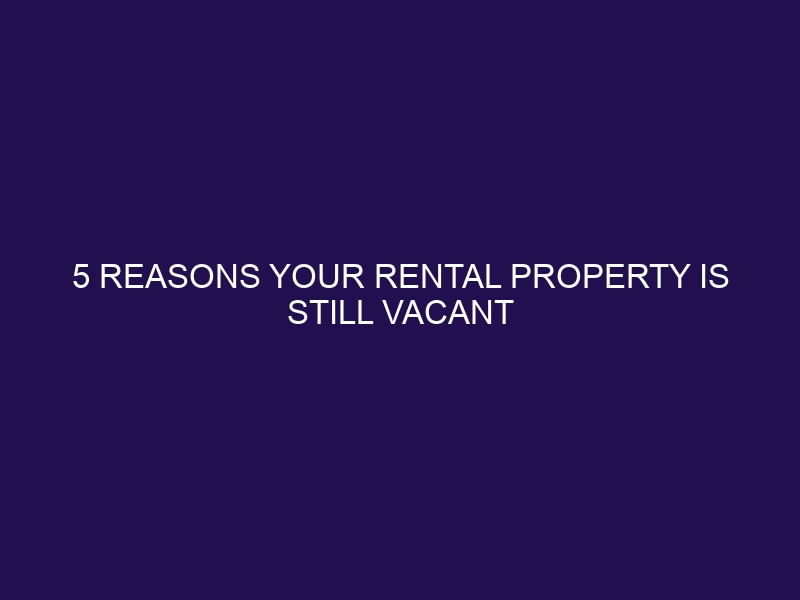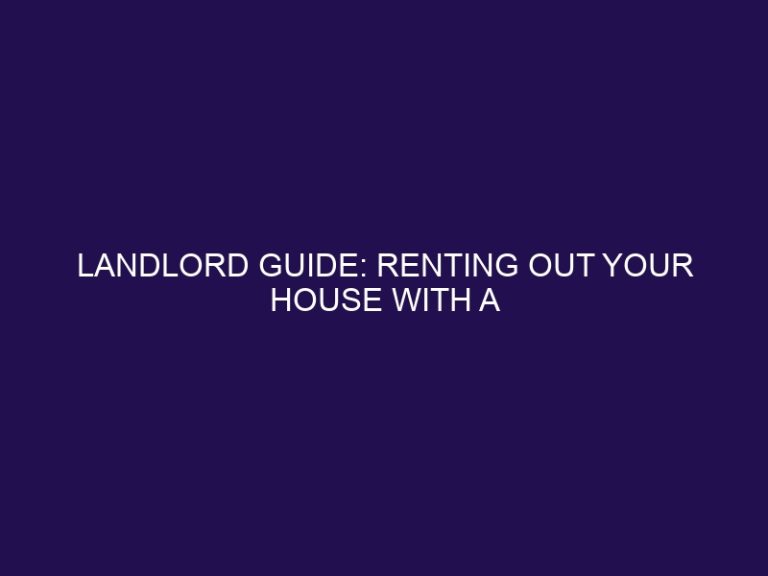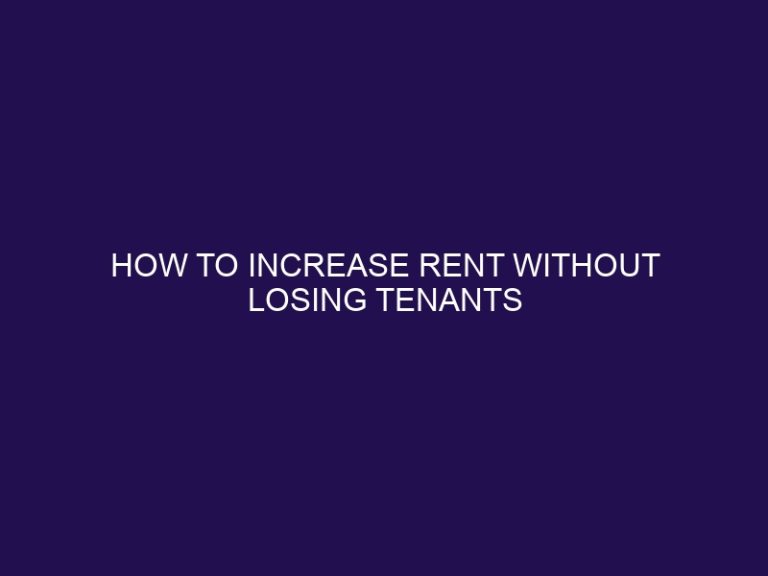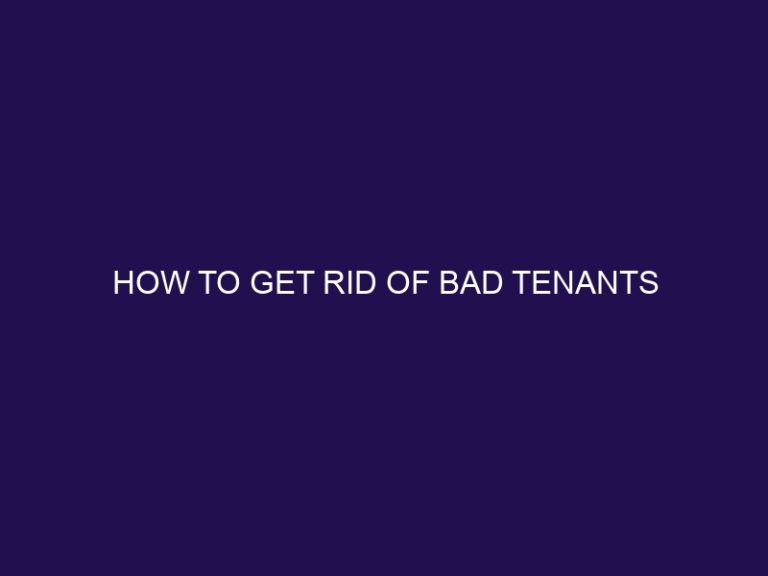5 Reasons Your Rental Property Is Still Vacant
Owning a rental property can be a rewarding investment, but it can also be frustrating when your property remains vacant for an extended period. There are several reasons why your rental property may still be vacant, and it’s important to identify and address these issues to attract potential tenants. Here are five common reasons why your rental property might be vacant:
- Inadequate Marketing: One possible reason is inadequate marketing efforts. Poor quality photos, ineffective listing descriptions, and lack of online presence can significantly impact your ability to attract potential tenants.
- Uncompetitive Rental Price: Setting an uncompetitive rental price can deter potential tenants. Failure to conduct market research and lack of pricing flexibility may prevent you from staying in line with current market conditions.
- Property Condition: The condition of your rental property plays a crucial role in attracting tenants. Lack of maintenance and repairs can make your property unappealing. outdated or unappealing interior design can discourage potential tenants from choosing your property.
- Inadequate Communication and Responsiveness: Poor communication and lack of responsiveness to inquiries can turn away potential tenants. Timely responses to inquiries and promptly scheduling and conducting property showings are essential for attracting tenants.
- Unattractive Location or Neighborhood: The location and neighborhood of your rental property can significantly impact its attractiveness. High crime rates, inadequate amenities, and facilities in the area can deter potential tenants.
Addressing these factors can help improve the vacancy rate of your rental property. By implementing effective marketing strategies, conducting market research, ensuring proper property maintenance, prioritizing communication and responsiveness, and considering the location and neighborhood, you can attract potential tenants and reduce the duration of vacancy for your rental property.
Reason 1: Inadequate Marketing
Are you struggling to find tenants for your rental property? Look no further, because we’re diving straight into the first reason: inadequate marketing. From poor-quality photos to ineffective listing descriptions and a lackluster online presence, we’ll explore the common pitfalls that may be keeping potential renters at bay. Stay tuned to discover how you can revamp your marketing strategy and fill those vacant rental units in no time.
Poor Quality Photos
Poor quality photos can have a significant impact on the occupancy rate of a rental property. When promoting a rental property, it is crucial to present it in the most appealing way possible in order to attract potential tenants. There are several reasons why poor quality photos can be detrimental:
- Inaccurate representation: Low-quality photos fail to accurately depict the property’s features, potentially deceiving potential tenants.
- Lack of interest: Prospective tenants are more likely to overlook listings with blurry or unattractive photos, resulting in fewer inquiries.
- Missed opportunities: High-quality photos grab attention and generate more interest, increasing the likelihood of scheduling property showings.
- Unprofessional image: Poor quality photos can give the impression of an unprofessional landlord or property manager, hampering the establishment of trust with potential tenants.
- Competition disadvantage: In a competitive rental market, properties with visually appealing photos are more likely to stand out and attract high-quality renters.
Ineffective Listing Descriptions
Ineffective listing descriptions can have a negative impact on the rental property, resulting in it being left vacant. To ensure that your listings are compelling and informative, follow these guidelines:
- Utilize descriptive language to showcase the unique features and amenities of the property.
- Provide accurate and detailed information regarding the location, size, and condition of the property.
- Present high-quality photographs that effectively display the appearance and appeal of the property.
- Include clear and concise rental terms, such as lease duration, monthly rent, and any additional fees.
- Highlight the advantages and benefits of living in the area, such as proximity to schools, parks, or transportation options.
Pro-tip: Tailor your listing descriptions to attract your desired audience by incorporating keywords and phrases that will resonate with potential tenants.
Inadequate Online Presence
An inadequate online presence can contribute to a vacant rental property. Landlords should prioritize establishing a strong online presence to attract prospective tenants. Here are some factors to consider:
- High-quality listings: Ensure that your online listings have clear, appealing photos and detailed descriptions to highlight the property’s features and amenities.
- Optimized marketing strategy: Utilize various real estate websites and social media platforms to reach a wider audience of potential renters.
- Responsive communication: Timely responses to tenant inquiries and prompt scheduling of property showings demonstrate professionalism and increase the chances of renting out the property quickly.
Reason 2: Uncompetitive Rental Price
Uncover the second reason your rental property may still be vacant – an uncompetitive rental price. We’ll explore the failure to conduct market research and the lack of flexibility in pricing, shedding light on how these factors can impact the demand for your property. Prepare to discover crucial insights that will help you make informed decisions about setting the right rental price for your property.
Failure to Conduct Market Research
In order to avoid vacancies, it is crucial for landlords to conduct market research. Failure to conduct market research can often be the reason why rental properties remain vacant. When landlords fail to research the local rental market, they may unintentionally set an uncompetitive rental price. This can lead to a lack of interest from prospective tenants. Additionally, if landlords do not take the time to understand the demands and preferences of renters in the area, they may end up offering inadequate amenities or features. On the other hand, conducting thorough market research allows landlords to stay informed about rental trends, competitor pricing, and tenant preferences. By doing so, they can make well-informed decisions about their rental property and attract more potential renters. Overall, it is clear that failure to conduct market research can have a negative impact on rental income and result in higher vacancies. Therefore, landlords must prioritize conducting market research to optimize their rental income and minimize vacancies.
Lack of Flexibility in Pricing
The Lack of Flexibility in Pricing can contribute to a rental property remaining vacant for an extended period of time.
- 1. Failure to adjust rent: Failing to evaluate market trends and adjust the rental price accordingly can make the property uncompetitive in the rental market.
- 2. Fixed rental terms: Not offering flexible lease terms, such as shorter or longer lease durations, can limit the pool of potential tenants.
- 3. Unwillingness to negotiate: Being inflexible with negotiating rental terms, such as security deposit or pet policy, can deter potential tenants.
Fact: According to a study, properties that offered flexible pricing strategies experienced a 35% decrease in the time it took to fill vacancies.
Reason 3: Property Condition
Is your rental property struggling to find tenants? Let’s dive into reason number three: property condition. We’ll explore two key factors that might be deterring potential renters: lack of maintenance and repairs, as well as outdated or unappealing interior design. Stay tuned to discover how addressing these issues can significantly boost your property’s appeal and increase your chances of finding the perfect tenants.
Lack of Maintenance and Repairs
- Lack of regular maintenance and repairs: Neglecting routine maintenance tasks can lead to issues such as leaks, malfunctioning appliances, and deteriorating infrastructure.
- Deferred repairs: Ignoring necessary repairs can result in further damage and make the property less desirable to potential tenants.
- Poor upkeep: Failing to keep the property clean, tidy, and well-maintained can create a negative impression and discourage potential tenants.
- Outdated amenities: If the property lacks modern amenities or features that tenants expect, it may struggle to attract renters.
- Inadequate response to tenant concerns: Failing to address maintenance and repair requests in a timely manner can lead to frustration and dissatisfaction among current tenants.
True story: A landlord neglected to fix a leaking roof in one of their rental properties. As a result, the water damage worsened, causing mold growth and compromising the structural integrity of the building. The property remained vacant for months as potential tenants were deterred by the evident lack of maintenance and repairs. Eventually, the landlord had to invest a considerable amount of money to repair the extensive damage and restore the property before it could attract new tenants.
Outdated or Unappealing Interior Design
- An outdated or unappealing interior design can make a rental property seem unattractive to potential tenants.
- Old or worn-out appliances may deter renters who are looking for modern amenities.
- Poor lighting or outdated light fixtures can create a dull or uninviting atmosphere.
Pro-tip: Updating the interior design of your rental property can increase its appeal and attract more tenants. Consider painting the walls with a fresh, neutral color, replacing outdated fixtures with more modern ones, and investing in new furniture or accessories. These small changes can make a big difference in attracting high-quality renters and filling your vacant property faster.
Reason 4: Inadequate Communication and Responsiveness
Are you wondering why your rental property is still sitting vacant? Well, there’s one major reason that often gets overlooked – inadequate communication and responsiveness. In this section, we’ll dive into the impact of poor communication on potential tenants. We’ll uncover the consequences of delayed or ignored inquiries, as well as the negative effects of failing to schedule and conduct property showings. Get ready to sharpen your communication skills and fill those vacancies!
No Timely Responses to Inquiries
When it comes to filling vacancies in your rental property, no timely responses to inquiries can be a major hindrance. Prospective tenants expect prompt communication and if their inquiries go unanswered, they may lose interest or seek other options. By promptly responding to inquiries, you show professionalism and a commitment to customer service. This can help build trust and increase the likelihood of securing quality tenants. To ensure timely responses, consider setting up automatic email alerts for new inquiries, hiring a property manager, or implementing a system that ensures all inquiries are addressed within a specific timeframe.
Failure to Schedule and Conduct Property Showings
Failure to schedule and conduct property showings can result in an extended vacancy period in rental properties. Prospective tenants heavily depend on property showings to evaluate the suitability of a rental unit, and a failure to schedule these showings can dissuade potential renters. To prevent this scenario, landlords should prioritize prompt responses to inquiries and take a proactive approach in scheduling and conducting property showings. Leveraging multiple platforms, such as realty websites and social media, can effectively reach a broader audience. Ensuring that the property is prepared for rental and presenting it in the most favorable way during showings can significantly enhance the chances of attracting high-quality renters.
Reason 5: Unattractive Location or Neighborhood
Are you struggling to fill your rental property? Well, one possible reason could be its location or neighborhood. In this section, we will explore the fifth reason why your rental property is still vacant: an unattractive location or neighborhood. We’ll take a closer look at the high crime rate and the lack of amenities and facilities that may be turning potential tenants away. So, if you’re wondering why your property remains unoccupied, keep reading to uncover the impact of location on tenant interest.
High Crime Rate
Properties located in areas with a high crime rate often struggle to attract tenants. Prospective renters prioritize their safety and prefer neighborhoods with low crime rates. To address this issue, landlords can take the following steps:
- Enhance Security Measures: Install security systems, adequate lighting, and secure locks to improve the safety of the property.
- Collaborate with Local Authorities: Partner with local law enforcement to tackle crime-related concerns and increase patrols in the area.
- Emphasize Safety Features: Highlight security measures in your property listings, such as gated entrances or on-site security personnel.
- Consider Neighborhood Revitalization: Collaborate with local community organizations to initiate programs that promote neighborhood safety and reduce crime.
- Provide Tenant Safety Resources: Offer resources and information to tenants on crime prevention strategies and community safety initiatives.
Improving the safety and security of the neighborhood can help attract quality tenants and reduce the vacancy rate.
Lack of Amenities and Facilities
One reason for a rental property to remain vacant is the lack of amenities and facilities available to potential tenants. It is important to ensure that the property offers desirable amenities such as a gym, pool, parking, or laundry facilities in order to attract tenants. Additionally, considering the availability of essential facilities like schools, hospitals, parks, and shopping centers in the vicinity can make the property more appealing.
Frequently Asked Questions
How can landlords avoid vacancies in their rental properties?
Landlords can avoid vacancies in their rental properties by implementing effective marketing strategies, conducting thorough tenant screening, and pricing the rent competitively. They should also ensure the property is rental-ready, provide clear rental information, and advertise on multiple websites to reach a larger pool of potential tenants.
What are some tips for advertising vacancies to attract more tenants?
To attract more tenants, landlords can utilize multiple advertising channels such as Zillow, Trulia, Rent.com, and Facebook marketplace instead of relying solely on Craigslist. It is also important to include important rental information such as price, beds/baths, utility responsibilities, and parking in the listing description. Additionally, using high-quality images and providing a web-based application process can make it easier for potential tenants to apply.
What are the potential risks of having a vacant rental property?
A vacant rental property can pose several risks for landlords, including loss of revenue, potential expenses from damage or theft, and additional taxes in certain areas that levy charges on empty homes. Having tenants occupying the unit provides peace of mind as they can notice and report any risks, ensuring the property is well-maintained and secure.
Is overpricing a common reason for rental properties remaining vacant?
Yes, overpricing a rental property can deter interested renters and lead to extended vacancy periods. To avoid this, landlords should compare the rental price with similar properties in the area to ensure they are staying competitive. Adjusting the rent to a reasonable and market-appropriate rate can help attract more potential tenants and fill vacancies faster.
How can landlords reduce the risk of incomplete tenant screening?
To reduce the risk of incomplete tenant screening, landlords should consider using web-based programs that make the application and screening process easier for applicants. By streamlining the process, landlords can attract more qualified tenants and ensure a thorough assessment of their rental history, income requirements, and other relevant factors.
What can landlords do to make a rental property more appealing to potential tenants?
Landlords can make a rental property more appealing to potential tenants by ensuring it is clean, well-maintained, and rental-ready. Addressing any issues caused by current tenants, such as noise or dirt, is essential to create a positive impression during showings. Offering discounts or incentives, such as lowered rent or waived security fees, may also help attract tenants and fill vacancies faster.







